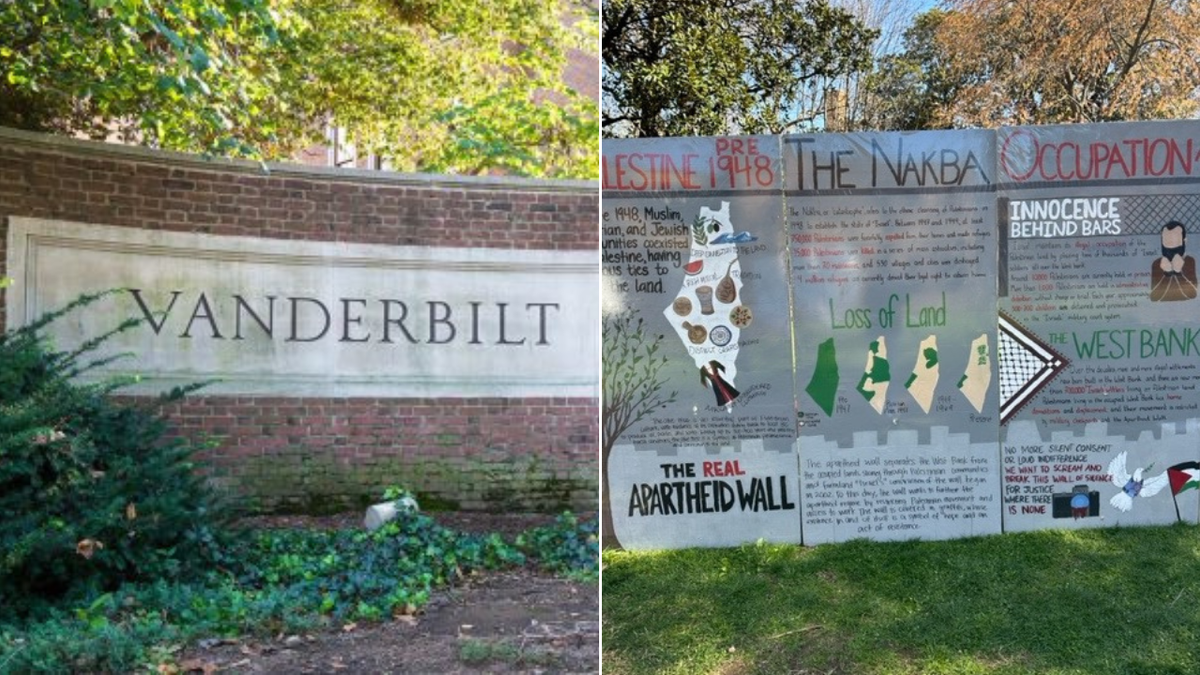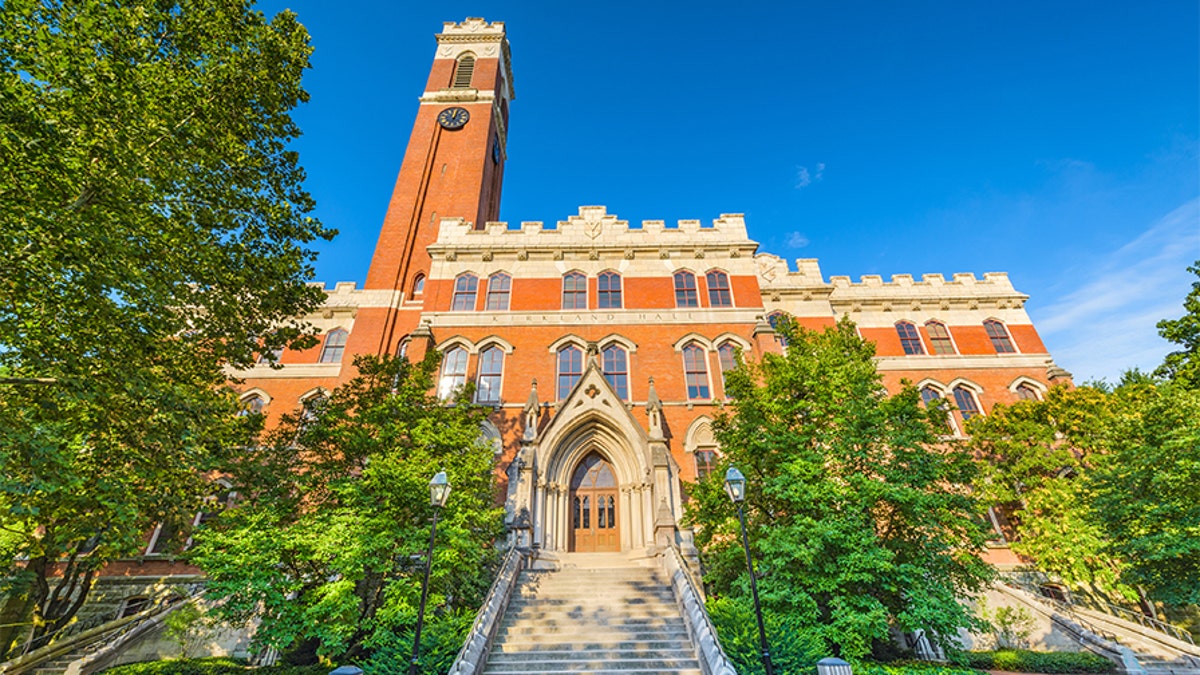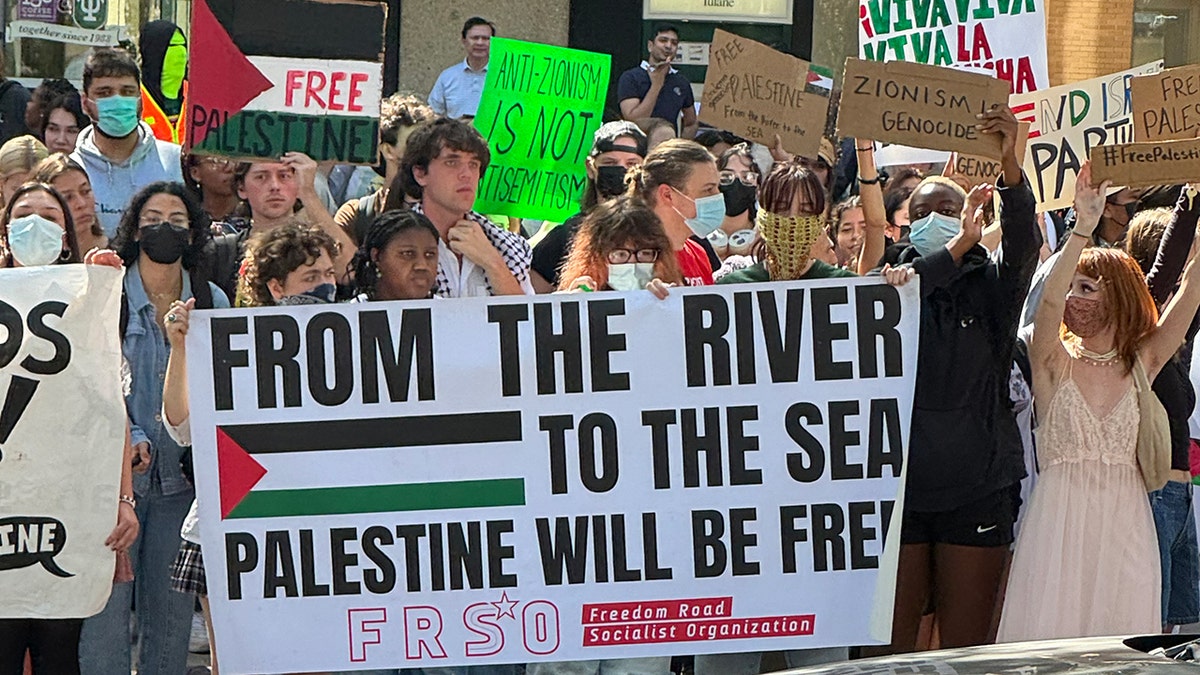Vanderbilt University students flood an administrative building protesting the university's removal of an anti-Israel, Boycott, Divestment and Sanctions initiative
Students were suspended and arrested following an hours-long sit-in on Tuesday where they physically assaulted a Community Service Officer to gain entrance and pushed staff members who offered to meet with them.
In the wake of a 22-hour pro-Palestinian protest that left a school officer injured and resulted in the arrest of four participants, Jewish students at Vanderbilt University told Fox News Digital that they are still cautiously optimistic about the state of free speech on campus.
Over two dozen Vanderbilt University students protested the administration's removal of an anti-Israel, Boycott, Divestment and Sanctions (BDS) initiative from the student ballot during a day-long sit-in on March 26, Fox News Digital previously reported. The removal of the amendment to the Vanderbilt Student Government Constitution, which would have prevented student government funds from going to certain businesses that support Israel, prompted students to march into the halls of Vanderbilt Chancellor Daniel Diermeier’s office in protest.
About 27 students broke into the closed administrative building, physically assaulting a Community Service Officer to gain entrance while pushing and shouting at staff members who offered to meet with them. An additional 30 students protested on the steps outside the building.
Three students were charged with assault of the officer, while one student protesting outside the building was charged with vandalism after smashing a window. All students involved in the sit-in inside the building were suspended and will go through the formal disciplinary action process.

Vanderbilt University sign and VDC display.
"Any student or any person that will look at that video and defend the kids and just say that they were peacefully protesting and rushing in, they are completely wrong," Ryan Bauman, a current senior at Vanderbilt University and Jewish leader among multiple campus groups, told Fox News Digital. "If you take two seconds and try to ask what happened to that officer, you get the answer that he is not in good shape. His arm is really messed up."
The BDS amendment followed guidelines set forth by the national BDS movement to prohibit the spending of funds on businesses deemed "complicit" in what Israel's foes believe to be an illegal occupation of Palestinian territories. BDS has been decried by critics, including the Anti-Defamation League, as antisemitic.
The amendment, which had collected over 600 signatures and qualified for the ballot, was put forth by Vanderbilt’s Divest Coalition (VDC), a self-described coalition of student organizations on Vanderbilt's campus "launching a campaign for the passage and adoption of a Boycott, Divestment, Sanctions (BDS) constitutional amendment by Vanderbilt Student Government (VSG)," including Jewish Voice for Peace and Students for Justice in Palestine, according to the VDC website. The VDC has been posting updates to its Instagram page.
Now, the group is petitioning the university to unsuspend the students involved in the sit-in, drop the charges on the four students and reinstate the BDS resolution, but Bauman said the university has quietly assured them "that BDS is not in line with their values."
Daniel Diermeier, the chancellor of Vanderbilt University, penned an op-ed for Wall Street Journal Opinion championing free speech on Vanderbilt's campus, but admitted that the "culture of free expression" was tested for about 24 hours on March 26 when students in favor of the BDS resolution forced their way into his office building while injuring staff and screaming profanities.
"I made clear at the start of the semester that, consistent with our commitment to institutional neutrality, Vanderbilt doesn’t boycott or divest from companies doing business in or with specific nations, unless required by law," he wrote.
"Students can advocate BDS," he wrote. "That is freedom of expression. But they can’t disrupt university operations during classes, in libraries or on construction sites. The university won’t adopt BDS principles. That’s institutional neutrality. As a community, we should always remember to treat each other with respect and rely on the force of the better argument. That’s civil discourse."
Bauman told Fox News Digital that this is a personal issue for him, as he has friends who serve in the IDF, including a friend who died on October 20. After the October 7 terrorist attack, he said he reached out to the national Students Supporting Israel (SSI) group because Vanderbilt didn't have a chapter.
"I wanted to start SSI because I fully believe in their mission of being grassroots and kind of combating the extreme SJP [Students for Justice in Palestine] agenda with love of Israel, just love of culture, love of the people, love of the state, and it's not a religious organization, which is why I chose that to be the backing for what we want to do here," he said.

Daniel Diermeier, the chancellor of Vanderbilt University, penned an op-ed for Wall Street Journal Opinion where he laid out the university's free expression policies. (iStock)
"SSI, what I wanted to do with that was, not have it tied to the connotation of Judaism, but tied to the secular aspect of Zionism and being pro-Israel," he added. "We also now have a ridiculous amount of non-Jewish students that are joining SSI and showing their support for us, so it's really become a non-secular organization on campus."
Bauman explained that the BDS petition included a list of 17 companies and any student organization that receives money from the student government would not be allowed to use that money on the restricted companies.
"The example that the Divest Coalition put forward was, say SSI is having a general body meeting, and we want to order pizza, we are not allowed to order pizza from Papa John's or Pizza Hut or Domino's because they don't support BDS, we have to buy pizza from a different place such as Roma Pizza because they are a Palestinian-owned small local pizza shop," he explained.
Before the sit-in, Bauman said he felt like campus sentiment was more in favor of the VDC, but since their public break in to the campus building, he believes that sentiment has shifted.
"When it comes to campus sentiment, I think the protest really did a lot more harm to their cause than they thought," he said. "There's an app called Fizz... and it's very, very big at Vanderbilt and I was just curious on Tuesday, so I went on and most of the comments are saying: ‘These protesters are dumb.’ ‘What are they doing?’ ‘This is insane.’"
Bauman said he is personally confident about his identity and what he believes in, but explained that there are "a good amount of underclassmen" that are newer to campus and still trying to find their footing, so when they see pro-Palestinian students sleeping outside the chancellor's office chanting "From the river to the sea," they are scared.

Anti-Israel protests have been ongoing at universities across the country since October 7. (Credit: Ryan Zamos)
"A lot of students have come up to me... saying that they don't feel comfortable wearing their Jewish star necklaces, they don't feel comfortable wrapping teffilfin on campus, they don't feel comfortable walking on campus to Chabad and that's awful and that has nothing to do with their stance on Israel," he said. "That has to do with them being seen as a Jew walking on campus to a Jewish event, because everyone believes that all Jews are Zionists, which is not the case."
"The majority of us are seniors because even though we have one foot out the door, it still matters, these are still our friends that we've known for years that are going through this, even though we're leaving, we need to help them out," he added.
SHARE OF AMERICANS WHO SAY JEWS IN US FACE ‘A LOT’ OF DISCRIMINATION SPIKES SINCE 2021: POLL
Ryan Novick, a Jewish freshman at Vanderbilt, told Fox News Digital that he has a unique perspective because he arrived on campus right before the October 7 attack and doesn't know the "relative peace" that the Jewish community experienced in the previous 2–3 years.
"There have definitely been quite a few moments where it's felt challenging to be a Jewish student on campus," he said. Although, Novick said that until last week, before the sit-in, he never had any concerns about his safety, but now, he said "there definitely is another level now of thought before I would engage" with pro-Palestinian protesters.
"If people are willing to break a window and push through and end up hurting a community service officer who has training and whatnot, it definitely makes me question how much I would be willing to engage and pray for the sake of my own safety," he said.
"It definitely stifles discourse because without having both sides, you can't have a legitimate debate or a legitimate argument," he added. "It's been an issue and it's only going to get worse with the fact that we're now not feeling comfortable."
Novick warned that the BDS resolution might be gone for this election cycle, but said he wouldn't be surprised if, come springtime next year, they're dealing with the exact same resolution. Although, he applauded the university for "maintaining a position where they're not actively in conflict with the Jewish community," which he said he's heard has happened at other schools.










































